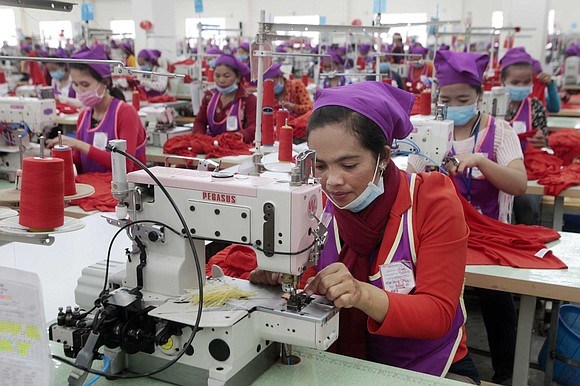The developing countries with the most to fear from Brexit
CNN/Stylemagazine.com Newswire | 2/4/2019, 10:52 a.m.

By Emily Dixon, CNN
(CNN) -- The potential fallout from Brexit won't stop with the UK and the European Union, a new study has found. The UK's departure from the EU may also pose a serious threat to developing countries that depend on trade with Britain, a new report has found.
Among the world's least developed countries, the heaviest blow will land on Cambodia, according to simulations conducted by the German Development Institute (DIE).
The UK's exit from the EU and its associated treaties and trade agreements could also sink a further 1.7 million people worldwide into extreme poverty, the authors of the report said.
"Regardless of the final outcome of the negotiations, Brexit implies fundamental changes in the British trade regime concerning third countries," the study authors wrote. "The UK must act to mitigate the adverse effects on economically vulnerable countries."
As an EU member, the UK takes part in the Everything but Arms (EBA) treaty as well as the European Generalized Scheme of Preferences (GSP), both of which remove or decrease duties on exports to the EU for developing countries. The EBA benefits 49 of the world's least-developed countries, waiving import duties to the EU on 99% of all exported products.
At present, Cambodia sends 7.7% of its exports to the UK, leaving it especially vulnerable in the event of a hard Brexit that would see the UK return to World Trade Organization rules. Increased tariffs and other barriers could see Cambodia's real GDP fall by 1.08%, and household consumption drop by 1.4%, according to this simulation.
Malawi, which sends 3.4% of its exports to the UK, would be the second most affected, DIE said. The country's GDP could decrease by 0.14%, while household consumption could see a 0.17% reduction.
Exports from the food and textile industries across EBA member countries would be hardest hit by new tariffs, the study authors said.
Curtis S. Chin, a former US ambassador to the Asian Development Bank and Asia fellow at the Milken Institute think tank, told CNN that Brexit will result in "disruption of economic and trade ties." The UK's trading future with the world's least developed countries, Chin said, is "still marked by uncertainty."
"In the long term, such disruption is likely to be addressed by new agreements and treaties," he said. "It is the near-term uncertainty that has the UK's trading partners worried."
Kristen Hopewell, a senior lecturer in international political economy at the University of Edinburgh, said the absence of EU trade preferences could see countries like Cambodia "priced out of the market," telling CNN, "There is a real risk that the interests of these developing countries could become collateral damage in the Brexit process."
"The key responsibility here falls on the UK," Hopewell said. "In order to prevent a major drop in LDC (least developed country) exports, it urgently needs to replicate the terms of the EU GSP and the EBA treaty and ensure that these arrangements are in place before the UK leaves the EU on March 29."
Extreme poverty could also increase in EBA countries after a potential hard Brexit, with Cambodia and Ethiopia worst affected, DIE said. A further 1.02% of Cambodia's population could enter extreme poverty, while Ethiopia could see a 1.12% increase. "In the case of Cambodia, the cause is mainly a relatively high loss of welfare, whereas for Ethiopia it is an increase in food relative to non-food prices" that will hit the poor hardest, the authors explained.
The reality for the world's least developed countries could be far worse than the report predicts, the institute said. "These estimated negative effects result only from changes in the UK's trade regime and therefore underestimate the overall impact, given the additional implications of uncertainty, depreciation, shrinking aid, remittances and investments," the study authors wrote.



